Veteran journalist finds himself part of Palu tragedy
“Fear started to grow inside me, but I had to go on because I swore to myself, I had to find my son that night or lose him forever.”
Change Size
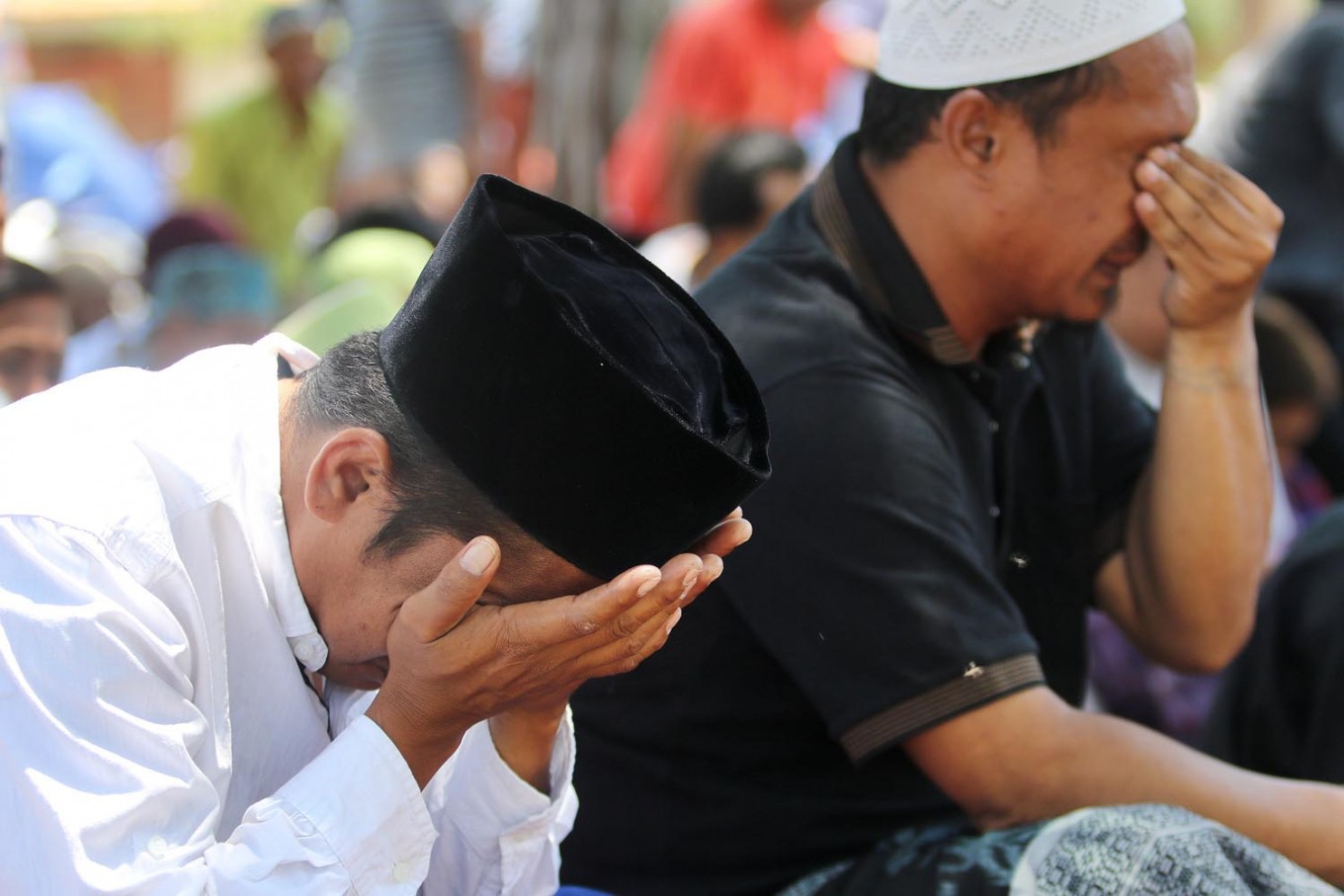 Two men weep after performing their Friday prayers in the front yard of the Darussalam Grand Mosque in Palu on Oct. 5. The mosque was badly damaged by the strong earthquake and therefore religious activities are being conducted in the front yard, which also serves as a shelter for survivors. (JP/Dhoni Setiawan)
Two men weep after performing their Friday prayers in the front yard of the Darussalam Grand Mosque in Palu on Oct. 5. The mosque was badly damaged by the strong earthquake and therefore religious activities are being conducted in the front yard, which also serves as a shelter for survivors. (JP/Dhoni Setiawan)
The Jakarta Post journalist Ruslan Sangadji, 43, has called Palu, Central Sulawesi, home for almost 30 years. As a journalist he covered the Poso bloody conflicts, spanning from late 1990s and early 2000, and later in 2004, the devastating Aceh tsunami.
When a powerful earthquake rocked Palu on Sept. 28, he was driving with his 5-year-old daughter in the back of the car, quite far from the beach. Only several minutes after the quake, he sent a message to the Post’s regional correspondent group: “Big quake just now. My car almost upended. Perhaps a 10-magnitude.”
Later, we lost communication for hours with him because of the power and communication blackouts in Palu city, and Sigi and Donggala regencies. Five days later, the Post’s Evi Mariani spoke to Ruslan, as a survivor first and later as a journalist, about the devastating first days after the 7.4-magnitude earthquake and tsunami that followed. Later he sent the Post more survivors’ accounts. Here’s his story:
Searching for his son
Hours after the powerful earthquake, Palu city was dead and chilling. Ruslan was driving around the city with his daughter, Lovely Nukila, 5, to search for his son, Akbar Fawaid, 14.
He did not see any other cars or motorcycles that night.
“Chilling, the first night was chilling,” he said.
“The night was pitch black. Palu was dead. I saw people were outside their houses, sitting, crying. I heard someone wailing because of his wounds. But some people were on guard, helping motorists like myself, telling me that I should not take this route because the road was damaged. The road had some sort of ‘speed bumps’ due to the damage. They told me, ‘turn left, don’t go here, the road is damaged’.”
In the desperate search to find his son, who lost communication with him for hours after the quake, Ruslan had to turn around eight times to find a route that had no damaged roads.
“Fear started to grow inside me, but I had to go on because I swore to myself, I had to find my son that night or lose him forever.”
After almost eight hours of searching, Ruslan and his daughter finally reunited with his son.
“I cried for the first time after the quake when I saw my son,” Ruslan said. “I didn’t just hug Fawaid, I carried him with me until he asked me to put him down.”
Later, his son told him that he and his friends had decided to head to the mountains because of the tsunami.
Ruslan had not heard about the tsunami until his son told him.
At 3 a.m., Ruslan and a fellow journalist went to the beach. “Oh my God, bodies were everywhere,” Ruslan said.
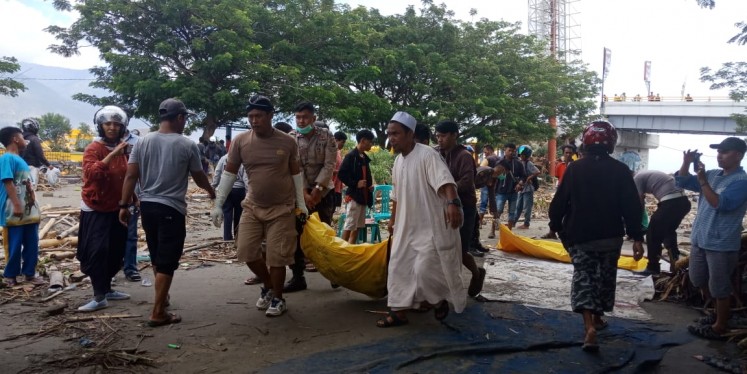
Fear and looting in Palu
During the search for his son, Ruslan passed a street near Petobo, an area damaged by soil liquefaction, a geological process by which the soil structure collapses because of strong tremors. He was unable to study the scene clearly, but he heard a roar and saw the mud.
“I was surprised to hear it, but at the time I did not know what it was. I fled because of it. I hugged my daughter along the way because by that time her fear was increasing,” he said.
Only in the morning, when he did his first interview with a survivor named Nasrudin, a Petobo subdistrict resident, did he hear the full story of the incident – which is unknown to many in Indonesia. Survivors who witnessed the liquefaction called it a “land tsunami”.
“Only wearing his underpants and crying, Nasrudin told me the story,” Ruslan said.
When the quake happened, he was in the bathroom. He ran out and told his wife and daughter to run for safety. After the swaying stopped, he returned to his house to get a towel and then ran out to the north. When he looked back, he saw his house was moving and there was mud.
Another survivor, Yusuf Hasmin, said he saw mud rolling like ocean waves.
In the morning, Ruslan began to search for help. From the Regional Disaster Mitigation Agency (BNPB), he got five tents for his extended family – comprising 35 people, including himself – to set up a shelter on Jl. Guru Tua in Palu.
He gave away three tents to other families and kept two for his own. But it started raining on Saturday night and the makeshift shelters were not large enough to keep them dry. So on Sunday he went out to search for a larger tent.
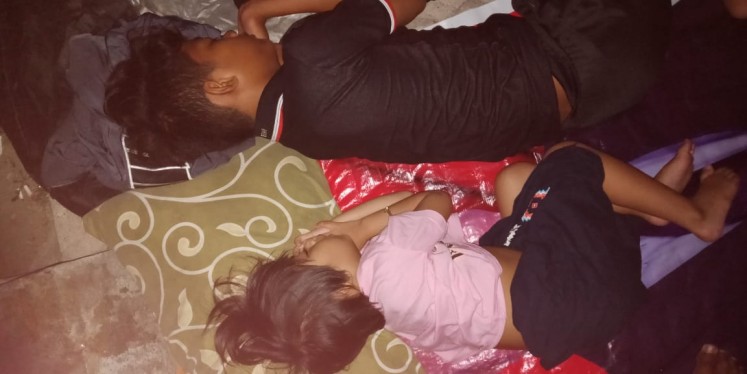
He met a soldier from the Indonesian Military (TNI) who yelled at him, saying he was busy and said Ruslan had to be quiet. Ruslan said the soldier told him twice that he would hit Ruslan if he kept asking for a tent.
Later, he met a friend who had just returned from asking for some food supplies at a main relief post. A government official had told his friend that he needed to bring his family card (KK) to be eligible for aid.
“Hearing this, I laughed. A family card, really? How can we have our family card ready in this kind of situation?” Ruslan said.
He added that five days after the earthquake, aid had yet to be distributed accordingly.
People began setting up their own relief posts for their neighborhood, but instead of giving aid, the posts begged for supplies with signs reading, “We need relief aid”.
And then the looting started. Ruslan witnessed two incidents with his own eyes.
“One happened to an Alfamidi store on Jl. Touwa. The store was in front of a military base camp. There were many people there. The second was another Alfamidi on Jl. Guru Tua,” he said. “People were hungry.”
Ruslan said he had not been tempted to loot because “luckily”, he still had some food left from when he bought supplies off the back of a pickup truck. He had also found shop that sold bottled water and later a market selling fish from Parigi Moutong regency.
Survivors’ stories
Ruslan’s house of several decades was totaled. A picture of what remains shows that the ground floor is nowhere to be seen; the only thing left standing was a door.
“I am sad about my house, of course. I’ve had it since I was still [working] in Antara [news agency]. The house was completed after I joined the Post. Two of my children were born there,” he said.
Ruslan has accepted the loss. Things can be replaced, but lives cannot, he said.
His relative, Fadel, was still searching for his daughter, Rahmi.
“His house was near the beach, about 2 kilometers from the coast. I looked for them at his house, and I saw on their door a piece of paper with a message it, naming all their three children, ‘Rahmi, Alam [and another, one I forgot], Mama and Papa are in the field in front of the Grand Mosque’. My heart stopped while reading it. The three children had been separated from their parents,” Ruslan said.
Another friend, Central Sulawesi councillor Yahdi Basma, lost his mother to the soil liquefaction. Ruslan and Yahdi ran into each other and Yahdi asked Ruslan to help him retrieve his mother’s body in the mud and under the rubble.
“So I went along with him and some military personnel to help retrieve his mother. The mud had dried but I stepped on a part that was still wet and soft, and half of my leg was buried. It took seven people to retrieve the body because she had been buried under the rubble. Someone had to saw off a wooden block, and then we had to carefully pull her body out without damaging it,” he said.
“We had to be really careful. And then we took turns carrying her; she was heavy and it was an uphill road.”
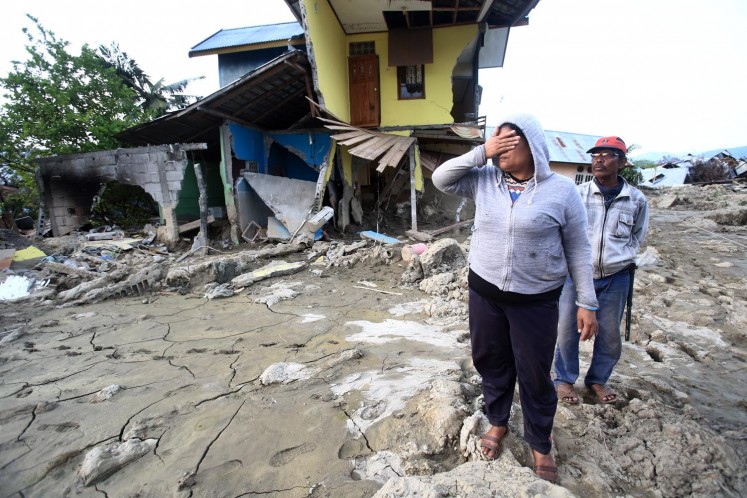
Heny Kurheco, 23, and her mother were attending to their food stall at the Palu Nomoni Festival when the tsunami hit. She told Ruslan that the waves had crashed into her, but she and her mother were still able to save themselves.
“Mama, I know you’re strong. If we die, let’s die together,” Heny recalled telling her mother.
Both survived by holding on to Ponulele Bridge for 30 minutes, with large waves slammed into them multiple times.
When the disaster struck, many people were on the beach for the festival. Asti had been with her daughter, Ramadani, who was one of the performers at the event.
Ramadani walked away from her mother to join the other dancers. Asti kissed her daughter that afternoon. It was their last kiss. The following day, Asti had to pick up her daughter inside a body bag. She had been found among the mangroves near Ponulele Bridge.
Another survivor told his own harrowing story. He was with three family members sitting and eating on the beach, waiting for a performance to start on the festival’s main stage.
When the waves began their assault, the four held on to each other’s hands, but they were continuously struck by trash and debris carried by the water. At one point, the group was struck so hard that two of his family members became separated.
He was desperately holding on to his remaining relative, but the waves crashed into them again and he lost his grip. He later found himself alone on the roof of a house. His relatives were all gone.
In the Perumnas Balaroa housing complex in West Palu, the scene was heart-breaking. Search and rescue personnel found four bodies holding on to each other.
“I know this family well. They were good people, modest people who did not get the second chance to live,” Ruslan said.
‘Second chance to live’
“Second chance to live”. Ruslan repeated this sentence several times; it was like a mantra to him. He first heard this sentence from a survivor he had interviewed a day after the disasters.
Ruslan’s experience in covering the Aceh tsunami and Poso conflicts had not prepared him for this.
“It is really different, being a survivor while working to cover the earthquake. It is harder. I went out and interviewed some people for the first three days. I thought it would help ease my trauma, but then I stopped. Between my job as a journalist, helping others and my children, it’s too much,” he said.
On the second day after the earthquake, Ruslan’s children started getting restless. They woke up at night, crying, partly because of the powerful aftershocks. On the fourth day, he took his children to his parents in Ternate. His ex-wife, the mother of his children who was in Jakarta during the disaster, would meet the children there later. Their eldest child is a student at Muhammadiyah Malang University in East Java.
Ruslan managed to get on an Air Force Hercules to Balikpapan, and then he boarded commercial flights to Makassar in South Sulawesi and later Ternate in North Maluku.
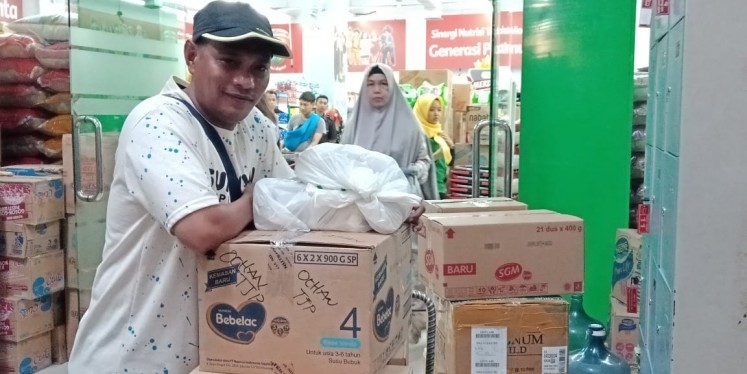
Ruslan was insistent on returning to Palu, despite his harrowing ordeal and despite being told by the Post that the newsroom did not expect him to send in reports because he is a survivor.
“Yes, I must do it. I must work and help people. And Palu is my home, where my work is,” he said.
An Indonesian businessman of Korean-descent contacted him and asked him to help distribute. So, after making sure his children were safe with his parents, he went back to Makassar to shop for some aid. He rented an ambulance to bring the supplies to Palu, to avoid being intercepted by some desperate survivors.
Earlier, he had sent a news report about people intercepting trucks carrying aid and stealing the supplies.
He was determined about his plan to send aid; he wanted to reach remote neighborhoods.
On Saturday at dawn, he set out with boxes of aid — disposable diapers, powdered milk, sanitary pads, fuel, drinking water, dried anchovies prepared by his family in Ternate — from Makassar for the 24-hour drive to Palu.
“There is no use in whining, but we have to accept and be grateful that we are still given a chance to live, so we can share what we have with others as much as we can,” Ruslan said. (emb)
The interview with Ruslan Sangadji was done in cooperation with The Sunday Times of the United Kingdom. Here's Ruslan's story on The Sunday Times.









